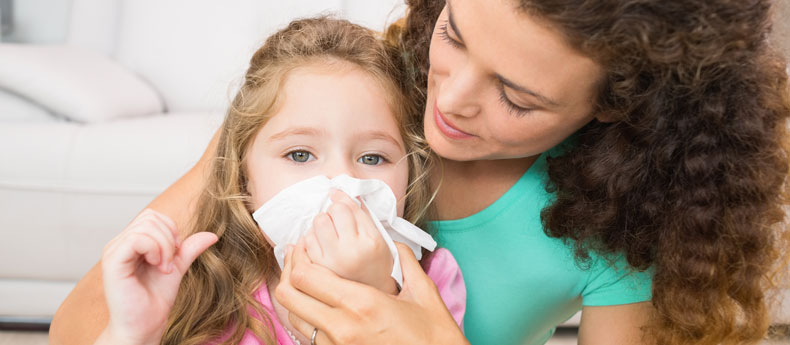
Cough, Runny Nose, and the Common Cold in Children
What causes cough, runny nose, and other symptoms of the common cold?
These symptoms are usually caused by viral infection. Lots of viruses can take hold inside your nose, mouth, throat, or lungs and cause cold symptoms. Most people get over a cold without lasting problems. Even so, having a cold can be uncomfortable. And if your child has a cold, it can be hard to know when the symptoms call for a trip to the doctor.
What are the symptoms of the common cold?
The symptoms include:
- Sneezing
- Coughing
- Sniffing and runny nose
- Sore throat
- Chest congestion
- In children, the common cold can also cause a fever, but adults
- do not usually get a fever when they have a cold.
When should you call the hospital?
Most people that have a cold do not need to see a doctor or nurse. But you should call your doctor or nurse if you have:
- A fever of more than 100.4 ºF (38 ºC) that comes with shaking, chills, loss of appetite, or trouble breathing
- A fever and also have lung disease, such as emphysema
- A cough that lasts longer than 10 days
- Chest pain when you cough, trouble breathing, or coughing up blood
- Refusal to drink anything for a long time
- Age younger than three months
- A fever and are not acting like yourself
- A stuffed or runny nose that gets worse or does not get better after two weeks
- Red eyes or yellow goop coming out of your eyes
- Ear pain, pull at your ears, or show other signs of having an ear infection
- Take your child to the emergency room if he or she:
- Becomes confused or stops responding to you
- Has trouble breathing or has to work hard to breathe
What can I do to feel better?
If you decide to try nonprescription cold medicines, be sure to follow the directions on the label. Do not combine two or more medicines that have acetaminophen in them. If you take too much acetaminophen, the drug can damage your liver.
Lots of fluids
A cool-mist vaporizer
Decongestants, the use of saline nose drops, sprays, or irrigation
What should I know if my child has a cold?
In children, the common cold is often more severe than it is in adults. It also lasts longer. Plus, children often get a fever during the first three days of a cold.
Are cough and cold medicines safe for children?
If your child is younger than six, you should NOT give him or her any cold medicines. These medicines are not safe for young children. Even if your child is older than six, cough and cold medicines are unlikely to help.
NEVER give aspirin to any child younger than 18 years. In children, aspirin can cause a life-threatening condition called Reye syndrome. When giving your child acetaminophen or other nonprescription medicines, never give more than the recommended dose.
How long will my child be sick?
Colds usually last 3 to 7 days in adults and 10 days in children, but some people have symptoms for up to 2 weeks.
Can the common cold lead to more serious problems?
In very few cases, yes. In some people having a cold can lead to:
- Pneumonia or bronchitis (infections of the lungs)
- Ear infections (in children)
- Other infections
How can I keep from getting another cold?
The most important thing you can do is to wash your hands often with soap and water. Alcohol hand rubs work well, too. The germs that cause the common cold can live on tables, door handles, and other surfaces for at least two hours. You never know when you might be touching germs. That’s why it’s so important to clean your hands often.
References:
“The common cold in children (The Basics)” retrieved from UpToDate
“The common cold in children: treatment and prevention” by Diane E Pappas
Copyright United Family Healthcare 2014 All right reserved - 京卫网审[2014]第1927号 - 京ICP备13017554号-4





